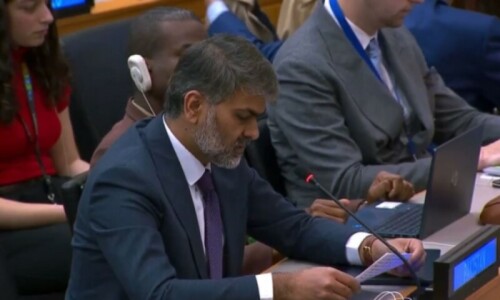ISLAMABAD: The Supreme Court on Thursday cautioned all federal and provincial government functionaries to refrain from misusing their authority to gain any benefit or favour for themselves or any other person.
Doling out jobs in the public sector through corruption, nepotism, favouritism, lack of due process and misuse of authority has remained a bane of our society, says the Supreme Court in a terse observation while deciding a 2002 appeal against illegal appointment of 145 people in the Oil and Gas Development Company Limited (OGDCL).
It must be realised and appreciated by all concerned that ministers and legislators exerting pressure upon civil servants for political favours in the public sector and a bureaucracy ready to oblige them form a deadly alliance and their unholy collaboration works as a recipe for destruction of merit, weakening of the state structure and promotion of injustice in the society, says a majority judgement authored by Justice Asif Saeed Khosa issued here on Thursday.
The majority judgement came on an appeal of NAB against the acquittal of former minister for petroleum and natural resources Anwar Saifullah through a June 13, 2002, verdict of the Lahore High Court.
An accountability court had awarded one-year imprisonment with a fine of Rs5 million to the former minister on appointing 145 people from 1994 to 1996 in violation of the rules in the oil and gas sector though set aside by the high court later.
Being aggrieved, the NAB moved the appeal against annulment of the conviction before the Supreme Court, seeking restoration of Saifullah’s conviction.
Justice Umar Atta Bandial, however, dissented by justifying in his note that though Saifullah acted wrongly but the means adopted by him of relaxing the rules as suggested to him by the then chairman of OGDC does not in the absence of his knowledge of illegality or wilful commission of an illegal act amounted to an offence.
Justice Khosa on the other hand observed that it was obvious that a society which allows merit to be sacrificed at the altar of political patronage, does nothing to prevent weakening of the State structure and which closes its eyes to injustice was doomed to self-destruct.
It is, therefore, about time that NAB and courts of the country come down heavily upon such predators of a strong, just and decent society, the majority judgement said.
“The shocking state of affairs has left us in no doubt whatsoever that the case in hand was not a case of a mere regularity in appointments but was a case of the respondent’s wilful bulldozing the regular procedure, forcing his will upon another vested with jurisdiction, approving/making appointments against the interests and requirements of the relevant institution and appeasing his political friends at the cost of over burdening the workforce and the budget of the institution he was meant to serve and protect,” the verdict said.
In his capacity as the federal minister, Saifullah forced his will upon a reluctant chairman of a public sector company and after relaxing the relevant rules he got 145 persons appointed to different jobs against the requirements of the company only to please his political friends in the Parliament, Justice Khosa regretted.
The verdict did not agree rather express surprise over acceptance by the high court of a culture of political patronage.
It is quite clear that by appointing 145 persons to different jobs in the company, Saifullah ignored the mandate of Articles 18 and 25 of the constitution and utilised his authority under the relevant law for extraneous considerations and purposes, Justice Khosa regretted.
Saifullah used his position and power against the interests of the relevant corporation of which he was in-charge and he had done all that to dish out undue favours to others by imposing his will upon a hesitant or unwilling competent authority.
The court had, thus, felt convinced that the charge under Section 9(a vi) of the National Accountability Ordinance, 1999, stood fully established against him, the judge observed. This appeal is, therefore, allowed, and the high court order is set aside, the judgement passed by the Accountability Court, Lahore on Nov 30, 2000 and the conviction and sentence of the respondent recorded through that judgement are restored.
Since the sentence of fine passed against Saifullah was about two decades old and the accused has already undergone his entire sentence of imprisonment, the court feels that insisting upon payment of fine by Saifullah or sending him behind the bars for non-payment of fine at such a late stage will amount to, in the words of Shakespeare, insisting upon a pound of flesh.
The court also ordered NAB chairman to bring this judgement to the notice of all federal and provincial ministers and secretaries of all federal and provincial ministries, divisions and departments in the country who might stand warned to avoid misusing their authority to gain any benefit or favour for themselves or any other person, or render or attempt to render or wilfully fail to exercise their authority to prevent the grant or rendition of any undue benefit or favour.
Published in Dawn, January 22nd, 2016















































